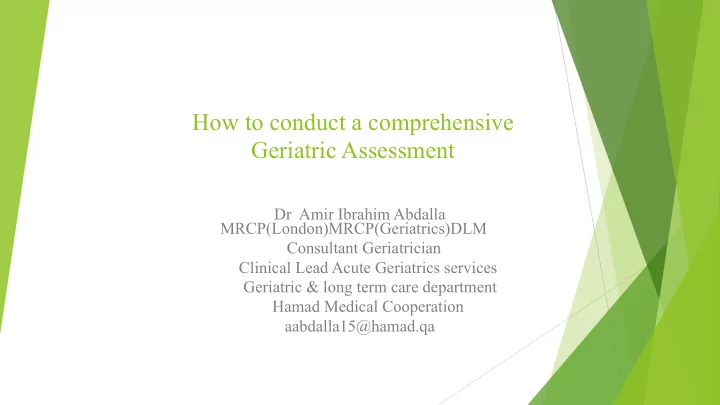

How to conduct a comprehensive Geriatric Assessment Dr Amir Ibrahim Abdalla MRCP(London)MRCP(Geriatrics)DLM Consultant Geriatrician Clinical Lead Acute Geriatrics services Geriatric & long term care department Hamad Medical Cooperation aabdalla15@hamad.qa
Disclosures I have no conflict of interest or disclosure in relation to this presentation
Learning Objectives u An interactive teaching session in how to perform CGA in timely manner in an acute setting
Session Plan u 0335-0350 CGA: What, Why, who & how u 0350-0400 Case study & discussion u 0400-0410 CGA Video u 0410-0415 Summary & closing remarks
Comprehensive Geriatric assessment “a multi-dimensional, interdisciplinary, diagnostic process to determine the medical, psychological and functional capabilities of a frail older person in order to develop a coordinated and integrated plan for treatment and long term follow up” Stuck et al, Lancet 1994
Physical Mental/Psychol ogical CGA Functional Social Environmental
Hospital CGA Ellis G, et al. 22 trials. 10,000 + participants, 6 countries. Compared to general medical care: u Patients more likely to be living at home. u Less likely to be living in residential/nursing care u Less likely to die or experience deterioration u More likely to experience improved cognition u Potential cost reduction u Specialist geriatrics wards had better outcomes than teams visiting wards. 8
CGA: Why u Under-diagnosed treatable conditions u Recurrent hospital admissions u Prolong hospitalization u Neglected rehabilitation u Polypharmacy u Evidence of benefits following geriatric assessment
CGA: Purpose u Improve diagnostic accuracy u Optimize medical treatment u prevent or delay complications u Improve medical outcomes u Improve function & quality of life u Optimize home environment u Reduce unnecessary non elective admissions/invasive treatment & investigations u Arrange effective care coordination/case management
Who “ staff” u Family physician u Case manager u Charge Nurse u Geriatrician u Administrators u Therapist u Others
Who “ client” u Age u Medical comorbidities (e.g., Hip fracture, TAVR) u Psychosocial problems u Specific geriatric conditions u High health care utilization u Consideration of change in living situation
Assessment Stratified Goals problem list Bespoke Management Plan
Case study u Lena 77 years old was admitted to hospital via the emergency department (ED) after being found on the floor at home. u PMH: COPD, hypertension, stroke & fracture neck of femur. u Lena had sustained two falls during the day, Lena was alert with a GCS score of 15/15 and an AMTS of 8/10; she was described by the admitting physician as a ‘poor historian’ and ‘too tired and deaf to talk’
u Temperature 38°C, pulse 98 BPM, RR 16 breaths , spo2 96%. u chest was clear on examination. CXR unremarkable u She was complaining of suprapubic pain and an X-ray of her hips showed no new injuries. She could weight bear without discomfort.
u She was identified as being mildly dehydrated and prescribed 1,000ml of intravenous (IV) normal saline over eight hours. u She was admitted by the on-call respiratory team who knew her as they had been treating her respiratory problems. u Corticosteroids, IV antibiotics and nebulizers were prescribed to treat an infective exacerbation of COPD
Identification of problems u Acute delirium due to mild dehydration and untreated urinary tract infection u Lena was not assessed using a CGA. If she had, it would have enabled the medical and nursing team to identify the UTI that was a probable cause of her falls and several other factors that should have informed her management plan
Discussion
Lena was not seen by the geriatric team until after she had developed delirium. Her initial diagnosis of COPD exacerbation was inaccurate and led to a delay in treating her underlying infection, which in turn contributed to her delirium and increased frailty. Many people with multiple long-term conditions will also have frailty which may be overlooked if the focus is on disease-based long-term conditions’.
By collecting information from Lena’s notes and collateral history from the carer and family, a picture emerged of increasing frailty compounded by three weeks of acute deterioration. Awareness of her baseline respiratory status showed that there were no acute changes at the point of admission leaving a question about the location of her infection. Lena was documented as complaining about suprapubic pain when she was in the ED and seeking a cause for this is likely to have resulted in earlier identification of her UTI. In addition, her cognitive impairment, based on the carer’s history rather than sole reliance on the AMTS.
Polypharmacy was another risk factor for delirium. However, in Lena’s medical notes it was recorded that she had a medicines reconciliation during her previous admission and her medications were appropriate. Once admitted, Lena was prescribed amoxicillin 1g IV three times a day and prednisolone 30mg once daily. Corticosteroids are considered to be a risk factor for delirium and are not recommended in high-risk older patients Lena was put on a standard regimen for a patient experiencing an acute exacerbation of COPD and the risk associated with starting corticosteroids in a patient at high risk of developing delirium was not considered. Nursing Older People. 28, 2, 16-22. doi: 10.7748/nop.28.2.16.s20
CGA Video
Making CGA work u Development of multi-professional teams u Clear identification of a joint core level of competence in assessment between health and social care practitioners u Clarity of when referral for specialist single professional assessment is appropriate u Information sharing systems u Regular MDT review meetings to share knowledge and develop team working
Take Home Message u CGA is the geriatrician’s gift to healthcare. u Stewardship of this gift should include promoting it, developing new ways of delivering it, teaching it and practising it with expertise. u None geriatricians should embrace it so that all older people with frailty, wherever they are and whoever they can see the benefit. u There should be a shared vision that infirm older people, wherever they are should be offered services that deliver the principles of CGA.
References\Further reading u https://www.bgs.org.uk/resources/resource-series/comprehensive- geriatric-assessment-toolkit-for-primary-care-practitioners u https://rcni.com/features/frailty-resource-collection
Recommend
More recommend